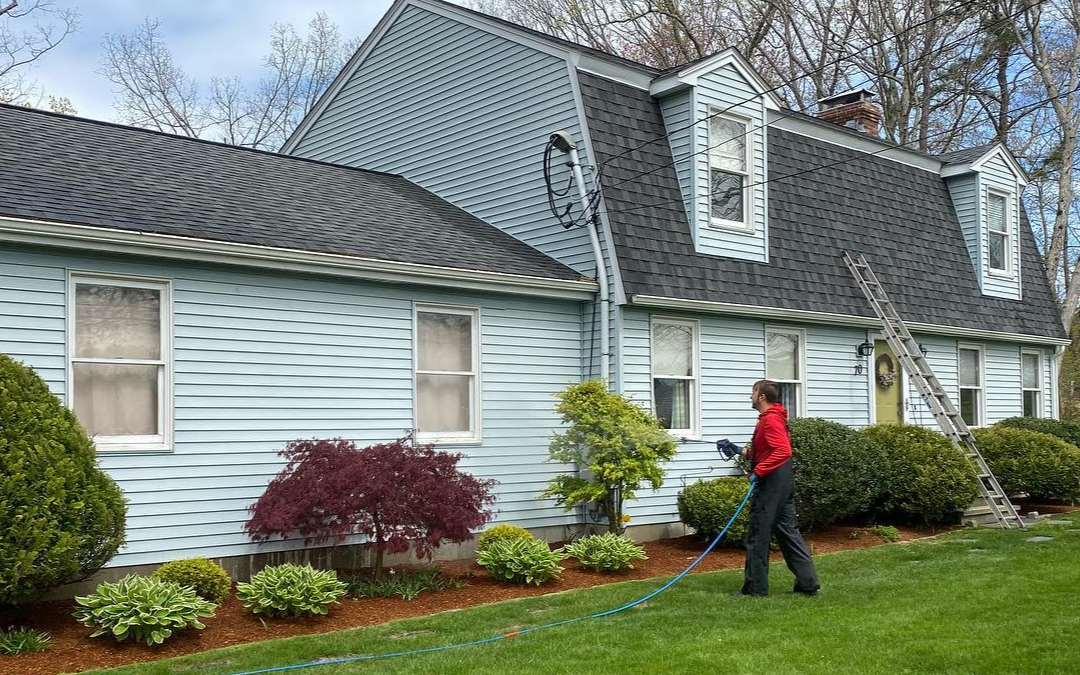Pressure washing is one of the most effective ways to clean your home’s exterior, but not all siding materials are created equal. While some can handle the powerful force of high-pressure water, others may be damaged without proper care. Understanding the compatibility of pressure washing with different siding types is crucial to maintaining your home’s beauty and longevity.
Table of Contents
1. Vinyl Siding
Vinyl siding is one of the most commonly pressure-washed materials because of its durability and resistance to moisture.
- Safe or Not?: Yes, with precautions.
- Key Considerations:
- Use a low-pressure setting to avoid cracking or dislodging panels.
- Ensure the water stream flows downward to prevent water from seeping behind the panels.
- Pro Tip: Avoid targeting areas with loose or damaged panels; repair them first.
Why It Matters: Proper technique prevents water intrusion and extends the lifespan of your vinyl siding.
2. Wood Siding
Wood siding, such as cedar or pine, adds a classic charm to homes but requires delicate handling during cleaning.
- Safe or Not?: Yes, with restrictions.
- Key Considerations:
- Use low pressure to prevent gouging the wood or stripping paint.
- Avoid prolonged exposure to water to prevent warping.
- Pro Tip: Soft washing may be a better alternative for wood siding.
Why It Matters: Overly aggressive pressure washing can cause irreversible damage to wood surfaces.
3. Brick and Stone
Brick and stone siding are highly durable and can usually withstand the force of pressure washing.
- Safe or Not?: Yes, with proper technique.
- Key Considerations:
- Use medium pressure to avoid dislodging mortar between bricks.
- Avoid acidic cleaners that can erode stone surfaces.
- Pro Tip: Focus on removing dirt, mildew, and moss to prevent structural degradation.
Why It Matters: Improper cleaning methods can weaken mortar and lead to costly repairs.
4. Stucco
Stucco siding is delicate and prone to cracking under high pressure.
- Safe or Not?: Generally no, unless soft washing is used.
- Key Considerations:
- Use extremely low pressure or soft washing to avoid damaging the textured surface.
- Inspect for existing cracks or damage before cleaning.
- Pro Tip: Professional services are recommended for stucco siding to avoid costly mistakes.
Why It Matters: Stucco can crumble or crack easily, making pressure washing a risky choice without expertise.
5. Metal Siding
Metal siding, such as aluminum or steel, is durable but not indestructible.
- Safe or Not?: Yes, with care.
- Key Considerations:
- Use moderate pressure to avoid denting.
- Avoid harsh chemicals that may cause corrosion.
- Pro Tip: Test a small area first to ensure the paint or coating isn’t damaged.
Why It Matters: Incorrect pressure washing can lead to cosmetic or structural damage.
6. Fiber Cement Siding
Fiber cement is known for its resilience and ability to mimic other siding materials.
- Safe or Not?: Yes, under controlled conditions.
- Key Considerations:
- Use a low-pressure setting to avoid chipping the surface.
- Avoid spraying water directly at joints to prevent water infiltration.
- Pro Tip: Rinse thoroughly to remove detergent and avoid streaking.
Why It Matters: Careless cleaning can compromise the water resistance and durability of fiber cement siding.
When to Call the Pros
While some siding materials can safely be pressure washed by homeowners, hiring a professional service ensures the best results. Professionals know how to tailor pressure settings, angles, and cleaning solutions to each siding type, avoiding costly damage.
Protect your home’s exterior with expert pressure washing from New England Pressure Cleaning. Our team is skilled in cleaning all types of siding safely and effectively. Call us today at 508-426-6209, visit our website, or check out our Google Maps listing to schedule your service. Let us keep your home looking its best without the risk!

